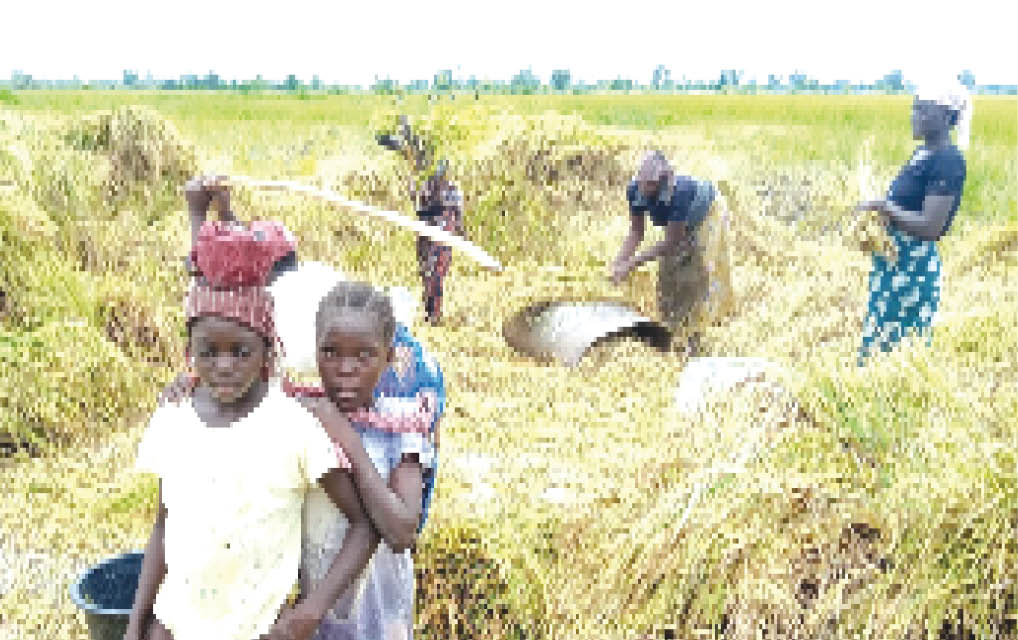It is a sad commentary that Nigeria, with its vast arable land, population size and other numerous potentials, still depends on importation for most of its agricultural needs including crops over which we have comparative advantage. Farming, which is the preoccupation of the majority of the citizens, is mostly rain-fed and subsistent.
Many farmers in Nigeria have to look for alternative means of sustenance once the rainy season ceases because dry-season farming is still a challenge. The dry season in Nigeria, with its characteristic absence of rainfall and high temperatures, usually lasts from October to March in the South and from September to April in the North.
Farming in the dry season therefore is irrigation-system dependent and only farmers with access to a watering source – groundwater (such as boreholes or wells) (extracted from springs or by using wells), and surface water (including rivers, lakes or dams and reservoirs) – can remain in business. This is with the attendant consequences on food security and availability.
A workshop on the benefits of Climate Information Service Delivery for Dry Season Farming, organised by the Human & Environmental Developmental Agenda (HEDA), in collaboration with the Nigerian Metrological Agency (NiMet) in Abuja in 2022, harped on the importance of dry season farming to Nigeria. “Dry season farming in Nigeria is a superlative way of averting the food crisis that is already upon us,” Sulaimon Arigbabu, Executive Secretary, HEDA Resource Centre, said, adding that dry season farming can prevent the food crises projected to bedevil Nigeria in 2023 as a result of the 2022 flood.
Plateau farmers get 120,000 fertilisers to commence dry season farming
Senator Goje distributes free fertiliser for dry season farming
To change the narrative, the federal government on November 25 this year flagged off the 2023/2024 dry season farming under the National Agricultural Growth Scheme and Agro-Pocket Project in Kadume Village, Hadejia LGA, Jigawa State through the Minister of Agriculture and Food Security, Senator Abubakar Kyari.
The minister disclosed the federal government’s target of 1.25 million tons of wheat production for the 2023/2024 dry season farming. He also pledged to support about 250,000 wheat farmers with a 50 per cent input subsidy to cultivate about 250,000 hectares during this year’s dry season so as to expand the capacity of the farmers to engage in the cultivation of key staples like rice, maize, cassava and wheat, across the country.
“The aim is to increase crop yield by at least 20 per cent compared to the previous year. These high-value staples will be joined by others like soybeans and sorghum in the wet season. The dry season farming is an integral part of the National Agricultural Growth Scheme and AgroPocket Project, made possible by a $134 million loan facility advanced to Nigeria by the African Development Bank (AfDB),” he said.
We however note that this is not the first time that the Nigerian farmers will hear the government talking about good policies. While declaring an emergency on food on May 13, this year, the president declared that all matters pertaining to food and water availability and affordability, as essential livelihood items, be included within the purview of the National Security Council. As of May, Nigeria’s annual inflation rate rose to 22.41 per cent y from 22.22 per cent in the previous month of April, according to the National Bureau of Statistics (NBS). The numbers keep rising, making it difficult for Nigerians to engage in even small-scale businesses.
The minister must therefore walk his talk by fulfilling all promises made to the farmers so as to achieve this laudable programme. The government should also continue to think outside the box by coming up with ideas that can make farming an all-year-round practice.
The contribution of the agricultural sector, driven mainly by crop production, to Nigeria’s Gross Domestic Product and employment, cannot be overemphasised. The Food and Agriculture Organisation (FAO) also declared that “With the increasing population (of Nigeria), estimated to reach 400 million by 2050, enhanced agriculture productivity through adaptation of new technologies and innovations is necessary to ensure food security.
There is also the need for the provision of proper storage and processing facilities to encourage the farmers, especially those who cultivate perishable crops like tomatoes, because, during the 2019/ 2020 season, farmers who cultivated tomatoes in Northern Nigeria reported the loss of over 40% of their yield due to lack of proper storage and processing facilities.
The federal government should therefore revive the numerous river basins in the country, make fertilisers accessible and affordable to farmers, reintroduce agricultural extension services and improve on monitoring and evaluation.
We must also pay attention to the threats posed by climate change and factors, such as aburgeoning population and shrinking land available for farming. For example, the United Nations advocates for early-maturing crop varieties which can yield positive harvests within three months of planting to protect farmers in case of low rainfall or drought. All around the world, governments and farmers are proffering new farming solutions and methods as a strategy to cope with less rainfall or water available for irrigation.

 Join Daily Trust WhatsApp Community For Quick Access To News and Happenings Around You.
Join Daily Trust WhatsApp Community For Quick Access To News and Happenings Around You.


